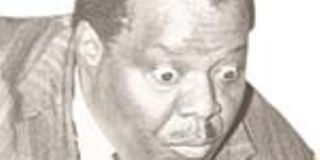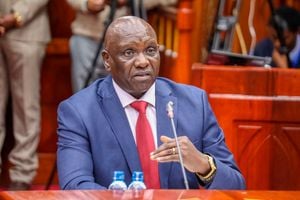Living differently

Living differently
Former Runyenjes MP Kamwithi Munyi prefers two wrist watches while post independence Agriculture Minister Bruce Mackenzie saw nothing wrong in dipping his false walrus moustache into a glass of champagne to the chagrin of certain socialites at Muthaiga Club. They shun convention and procedure, deriving pleasure from what many would consider weird.
But, on the other hand, it could be their unwavering adherence to certain norms that makes them different from the rest.

Kamwinyi Munyi
Then there are the weirdos like that high school chum, Gabriel who, when using the toilet, would hang his trousers on the door. Or the newspaper editor whose trip to the bathroom was incomplete unless he had a copy of a certain daily newspaper.
Welcome to the world of people who prefer the extraordinary to the common. Although they are generally normal, their taste for the bizarre often leaves us mystified and bemused.
Take Stanley Kimetto, the MP for Sotik, for example. He sports no bewildering headgear but parts his hair right in the middle, making him a throw-back from the 1950s. So far, no amount of criticism and sometimes ridiculing by the press has been strong enough to persuade the legislator into changing his mind and head-style.
It defines him in much the same way bow ties characterised former Githunguri MP Njehu Gatabaki, Kimani Wanyoike and Martin Shikuku. Incidentally, bow ties used to – and probably still do – irritate former Attorney General Charles Njonjo, who thought they were better left for waiters.
But, "Sir" Charles himself is known for his peculiar sense of dressing: a rose in his lapel on monogrammed three-piece pin-striped suits. An Edwardian waist-coat chain watch, checked hand-made shirts and polka-dot ties have long been his trademark and taste for upper-class English sophistry.
Then there was the late Bruce Mackenzie, a former Minister for Agriculture in the Kenyatta government, who at times went to the office in jungle boots. He also wore a fake moustache, which he was said to remove and dip in a glass of champagne while regaling his friends with Second World War jokes at the Muthaiga Golf Club.

Charles Njonjo in his trademark three-piece pinstripe suit, hand-made shirt, polka- dot tie and , of course the Edwardian waist-coat quarters under construction.
Mackenzie was also a daredevil of sorts. On one occasion, he was reported to have flown solo from Nairobi's Wilson Airport to the Maasai Mara Game Reserve against the advice of air traffic controllers, who had warned him against flying his friends there due to bad weather, which friends were driven to the Maasai Mara.
Mackenzie died in a trip from Uganda when a time bomb inside a stuffed lion exploded in his twin-engine Piper Aztec plane over Ngong Hills, in 1978.
Then there was Lord Maurice Egerton, after whom Egerton University is named. A pioneer settler, farmer who donated the 412 hectares on which the university stands, died a bachelor in 1956, aged 80.
Lord Egerton's hatred for women was so pathological that his farm-hands would be warned a week in advance to lock up their wives when he was scheduled to inspect his farm.
The hatred is said to have been caused by his fiancee who came visiting but left immediately unimpressed by the size of the Lord's cottage.
Determined to win her love, Lord Egerton vowed to impress her by building a castle similar to the one he owned in England.
Construction began in 1939 with materials and labour imported from Europe and the Orient. Ten years and 52 rooms later, he invited his fiancee to come and take a look. But all she did was sneer and return to England – for good. Thus Lord Egerton's hatred for women was born of that act of unrequited love. The remains of his hatred for women still exists in form of the "Men's Only Bar" at the Rift Valley Sports Club which he helped found.

Martin Shikuku whose burial plans are as good as finished;
But his castle, 15 kilometres from Nakuru town is now an agricultural museum.
Agriculture reminds one of produce such as eggs. That in turn reminds one of the former MP for Runyenjes, Kamwithi Munyi, who was known for his comic asides. In 1972, while serving as an assistant minister in the office of the President, Munyi, donated an egg to be auctioned for £49 at a Harambee in aid of Emuhaya constituency in Kakamega District.
Back then, the Daily Nation cost 55cts while £49 is Sh6,860 at current exchange rates.
Munyi also wore two wrist watches that glittered from the cuffs of his suits. During the Moi-era he curiously developed a taste for big checked suits featuring huge squares.
Former MP for Kinangop Mary Wanjiru rarely wore printed clothes. She preferred a flowing all-white ankle length garb, with matching head gear, shoes and a hand bag. The white clothes, she claimed, chased away evil spirits.
The Bachelor of Commerce graduate from the University of Nairobi was, however, more famous for her impromptu prayer sessions in the middle of Parliamentary debates, which earned her the nickname, "Prophetess."
A self-proclaimed herbalist, Wanjiru had also claimed to have discovered a cure for Aids, a sample of which she tabled in Parliament in 1993.
Then there is Taita Towett. The 80-year-old former MP for Buret has spent more than two decades underground, studying moles.
The author of Traditional History of the Kipsigis, Tears over a Dead Crow and 100 Daily Essays, has another defining feature; ties in national flag colours and the trademark pair of glasses, perennially perched atop his furrowed brow.
Some wishes can, at times, furrow one's brow. Like Geoffrey Griffin's, the late director of Starehe Boys' Centre whose wish to be buried inside the school chapel was fulfilled when he died in July this year. Or Martin Shikuku, who has already prepared his own grave and coffin.
"We'll all die one day. So why not prepare our own grave and coffin instead of harassing the living with harambees? And you know in Kenya, the higher your profile, the bigger the burial budget," says Shikuku.

Bruce Mackenzie
But doesn't that go against African customs? "There are two types of people. Those who uphold African customs or Christian spirituality. I am a spiritual man," he adds.
The rich and famous can be excused for being different.
Like industrialist Chris Kirubi, who is Kenya's only CEO disc jockey. But what about Kenyan thespians who exploit the common perception that there is a thin line between creativity and madness?
The funeral procession of the late stand-up comedian Joni Nderitu was held under a tree at the Kenya National Theatre in March 2000. There were no dirges or mourners in black, but just his fellow artistes mimicking the roles he played while drumming and singing the Luo songs he liked to croon in his husky voice.
"Artistes don't behave the way they do out of eccentricity," says Gitura Kamau, Joni's friend and fellow thespian, "It's their nature as most are free spirits who, unlike ordinary people, are not held back by any inhibitions."
David Weeks and Jamil James in Eccentrics: A study of Sanity and Strangeness, note that eccentrics totally embrace strangeness, flout convention, reject conformity and thrive on creativity and imagination. Most are intelligent idealists who are strongly motivated by curiosity.
"Eccentrics are natural born rebels who live longer as they're more in touch with themselves. And they are also bright people who from early childhood are aware that they are different."
Eccentrics exist the world over but a line should be drawn between plain loonies and eccentrics.
Jean Bedel Bokassa crowned himself Emperor of the Central African Republic Republic in full Napoleonic regalia. When he was overthrown human flesh was found in his refrigerators.
Uganda's Idi Amin believed that he was the "Conqueror of the British Empire" and the last King of Scotland. To prove this he once forced four whitemen to carry him shoulder high seated on a "throne."
There was also former Haitian President Francois Duvalier, popularly known as Papa Doc, who believed he had more powers than the King of Scotland. He thought that the assassination of John F. Kennedy was a result of his placing a curse on the US President.
Duvalier also rewrote the Lord's Prayer honouring himself.
Saparmurat Niyazov, President of Turkmenistan, renamed months of the year after his family and declared himself "Father of All Turkmen."
Ne Win, former Burmese dictator was obsessed with numerology. He sank the economy by creating 45 and 90 as currency denominations because 9 was his lucky number.
He reportedly walked backwards at times to avoid curses and supposedly came to believe Burma would find salvation by combining socialism with "magic."
And Kim Jong Il, leader of North Korea, is noted for his 20,000 movie tape collection, Cognac consumption, (he has a 10,000-bottle wine cellar). He stages all-night banquets at which attendance and heavy drinking is compulsory for high officials.
He also has a "pleasure squad "of strippers for his personal entertainment. To disguise enhance his five feet stature, platform shoes come in handy.
Maximiliano Hernández Martínez, former President of El Salvador never disguised the belief that hanging coloured lights in San Salvador, the capital city, would cure a smallpox epidemic.
Eccentricity is also more common among those in sports and creative fields: writers, painters and musicians.
Musician Prince also changed his name to the mouthful The Artist Formerly Known as Prince and then into a symbol.
Consider also former Chicago Bulls basketballer Dennis Rodman, who turned up for his 1997 wedding in a bridal gown while his bride wore a tuxedo.
Winston Churchill, former British war premier, was eccentric in several ways. He had two beds in his room. If he lacked sleep in one, he hopped into the other. He was also known to walk naked in his house while dictating speeches. When they stirred him, he cried as historian William Manchester notes in Churchill: The Last Lion.
Miguel Primo de Rivera, Prime Minister of Spain from 1923 to 1930, was also known for walking around in his underwear, and he disliked bathing.
Chinese strongman Chairman Mao Zedong, who never brushed his teeth, likened himself to a tiger, arguing that a tiger's teeth remain sharp even though they are never brushed.
Like Churchill, Al-Hakim bi-Amr Allah, (the Mad Caliph) who ruled Egypt from 996 to 1021BC also suffered from insomnia. But unwilling to spend sleepless nights alone, he ordered his subjects to sleep during the day and stay awake at night.
Then there was Sara Winchester, the heiress to the Winchester fortune, which her husband set up from manufacturing bullets. Sara was haunted by the fear that ghosts of the people the bullets killed would come calling. To tame that, she constructed countless rooms to confuse them. For 38 years, she added 184 rooms with 200 doors, 10,000 windows and 48 fire places, which sadly did not warm her fears.
For Boris Yelstin, former Soviet President, nothing beat the adrenaline rush of driving downhill towards trees then swerving abruptly – just for sport.




